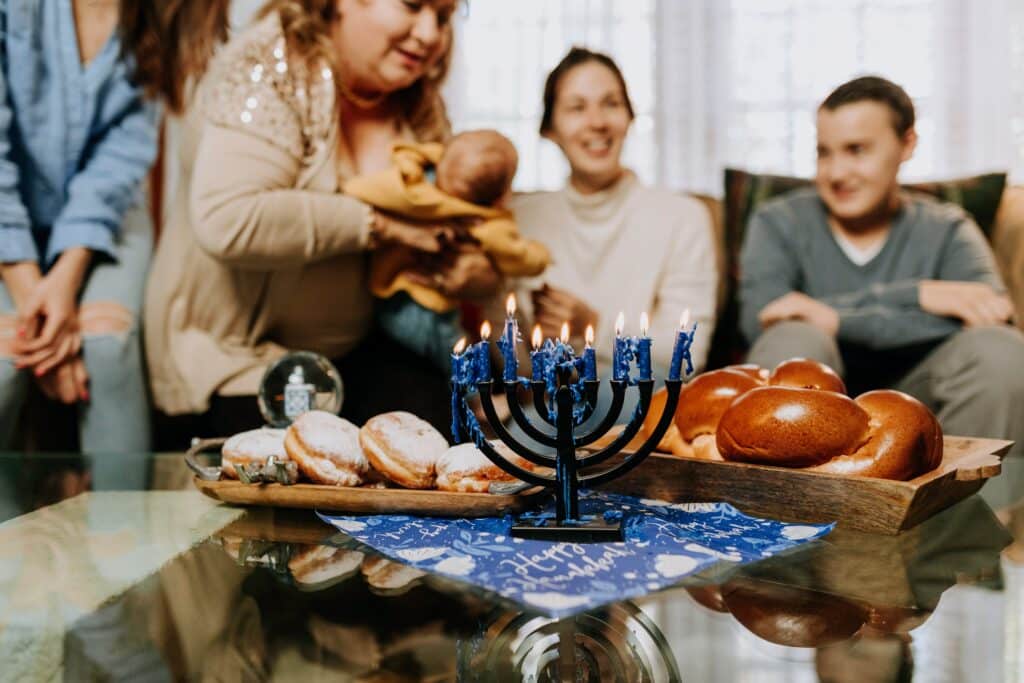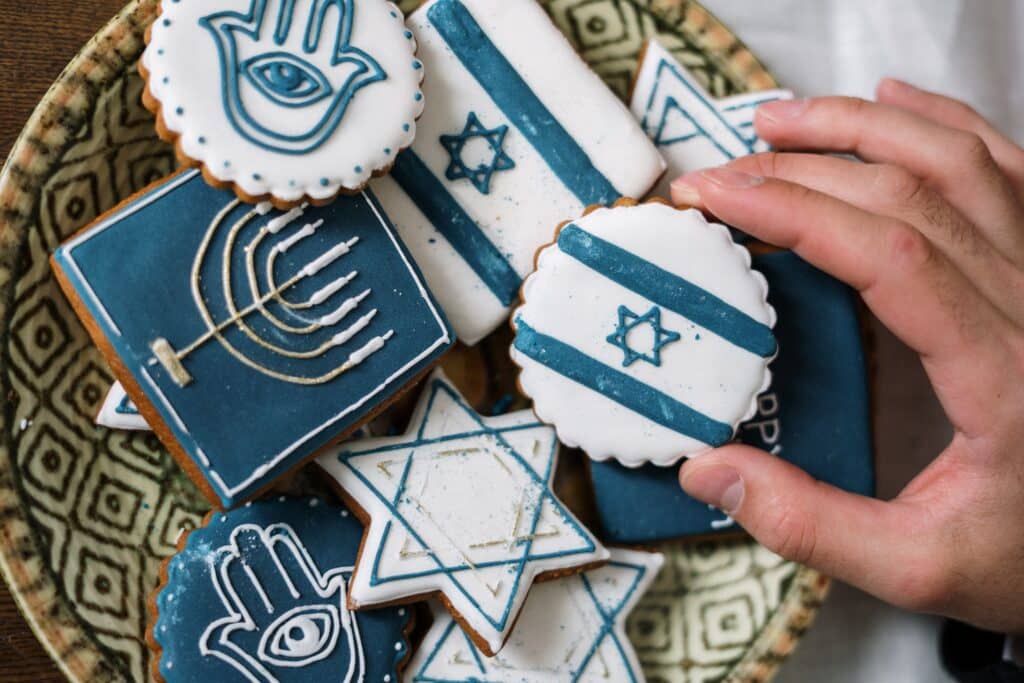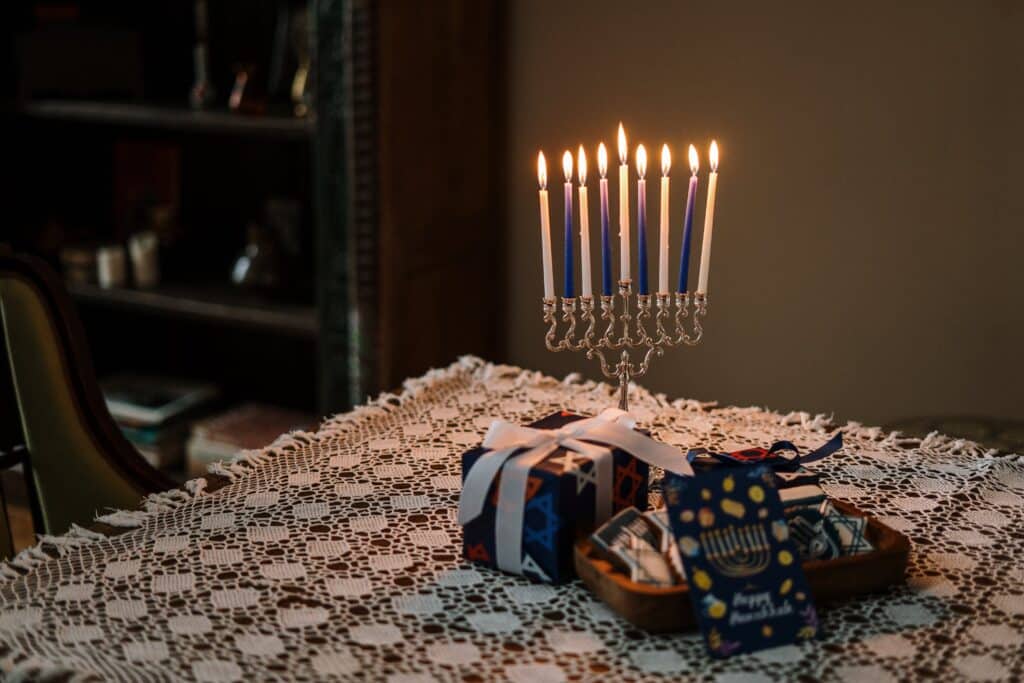
Many people celebrate Hanukkah, one of the most popular Jewish holidays, an eight-day festival, during the darkest, coldest season. Homes and communities are filled with light, pleasure, and warmth as the celebration takes place with Hanukkah candles, food, family, and friends. The addition of a candle each day, and a renewed focus on charity giving and tikkun olam over the holidays, both bring light to the season.
Hanukkah (chanukah), meaning “dedication” in Hebrew, commemorates the liberation and “rededication” of the Temple in Jerusalem by a small number of Jewish rebels in 165 B.C.E.
Often called the Festival of Lights, the holiday is celebrated with the lighting of the Hanukkah menorah, traditional foods, games, and Hanukkah gifts. Remitly has packed this article with a lot of enlightening and helpful information about the meaningful Hanukkah story.
Table of Contents
What is Hanukkah?
The Seleucids (Syrian-Greeks) dominated the Holy Land in the second century BCE and attempted to convert the people from Israel away from mitzvah observance and toward a belief in God in favor of Greek culture and ideas. Incredibly, under the leadership of Judah Maccabee, a tiny group of obedient but ill-equipped Jews overcame one of the world’s most powerful armies, expelled the Greeks from the region, regained Jerusalem’s Holy Temple, and reconsecrated it to God.
When they tried to light the seven-branched candelabrum known as the Temple Menorah, they found only one cruse of olive oil that had escaped Greek contamination. They lit the menorah miraculously, and the oil that was meant to last for one day extended to eight days before fresh oil could be made in keeping with the standards of ritual cleanliness.
Because the Maccabees were so outnumbered by the Syrian Greeks, the story of Hanukkah’s origin can teach us about perseverance and the glory of miracles. Nevertheless, they boldly battled for their homeland, temple, and the sacredness of their faith. The sages created the Hanukkah festival to honor and celebrate these marvels.
When does Hanukkah start and end?
When is Hanukkah? In 2024, this eight-day “festival of lights” begins on December 25th, at sundown, and ends on January 2nd. This date span is significant, as it always begins on the 25th day of the Jewish calendar month of Kislev.
On the civil calendar, this Jewish festival, generally coincides with the month of December. However, The dates of Jewish holidays according to the Gregorian calendar vary from year to year, since the Hebrew calendar is based on the lunar cycle. Because of this, the start of Hanukkah might fall between late November and late December.
The festivities kick off with menorah lightnings on the first night of Hanukkah.
The Hanukkah Menorah
The menorah, also known as the hanukkiah, is a central feature of the celebration. It is an eight-branched candelabrum to which one candle is added each night until it is completely lit on the eighth night.
The eight glasses holding Hanukkah candles in a row represent each night of the celebration. Every menorah has space for an additional candle, nine altogether, always in the middle or to one side and slightly elevated. This one is called “the shammash,” or, “one who serves.” Jewish tradition says the purpose of the Shamash Hanukkah prayer is that “Judaism gives light to the world.”
Lighting the Menorah
A candle is lit each day of Hanukkah, using the Shamash to light the others until all are lit. On the first night of Hanukkah, after sundown, the Shamash candlelights one Menorah candle. Shamash is lit again the second night to light two candles, etc. The menorah has the right number of candles, but they are lit from left to right, hence the highly recognized name being “The Festival of Lights”.
Hanukkah blessings are recited before the lighting of the Hanukkah candles. The traditional Hanukkah candle lighting service consists of saying three blessings (brachot) on the first night, and only the first and second blessings for the seven nights to follow.
Jewish people light a candle on each of the eight evenings in remembrance of God’s provision.

Traditional Hanukkah Foods
A true Hanukkah celebration includes a delectable buffet of traditional foods cooked in appreciation as a way to recall the legendary miracle that permitted the Jewish Maccabees to light their temple candles for eight nights when there was only enough oil for one.
Besides heavenly providence, the occasion celebrates wealth—and what better way to celebrate that with abundance!
Which Hanukkah meals are traditional? A good Hanukkah food list contains savory and sweet little snacks and large courses. To honor the miracle of the oil, fried meals are promoted. In commemoration of the legendary cruse of oil, it is traditional to eat foods fried in oil. The most familiar Hanukkah foods are the European (Ashkenazi) potato pancakes, or latkes, and the Israeli favorite, jelly doughnuts, chocolate gelt, and sufganiyot.
Families started giving their kids Hanukkah gelt as a present to the local Jewish teacher in late medieval Europe as a way to express gratitude for their education. Coins were eventually given to the kids as well in order to support their Jewish education.
Hanukkah Traditions and Customs
Giving gifts and playing with dreidels, four-sided spinning tops bearing the Hebrew letters nun, gimmel, hei, and shin—an abbreviation for nes gadol hayah sham, or “a great miracle happened there”—are two customs associated with Hanukkah. The object of the game is usually to win or lose a pot of money, nuts, or other items depending on which letter the dreidel falls on as it is spun.
The dreidel hasn’t always been all fun and games. During the Maccabean war for divine service, the Israelites could not worship. If the Greeks found them praying or studying the Torah, they were executed. The Hebrews devised a way to worship and serve YHWH. Dreidels were stored next to their Holy Books. They put away their books and pretended to play dreidel when Greeks came by. Dreidels saved numerous lives.
Hanukkah gelt is a gift-giving old custom, well attested in Europe. Gift giving, by contrast, is new. Because Hanukkah falls on or around Christmas, it has become a big commercial phenomenon in recent decades, especially in North America. Gifts haven’t traditionally been a focal point of the holiday.
About Hanukkah Celebrations Nowadays
Today, families and communities enjoy celebrations together in a lot of the same ways we’ve discussed. It’s common for Jewish families to have their own menorahs that they use for the 8 days of lighting. Many American synagogues also hold celebrations, and Talmud readings. Additionally, Jewish communities all over the world have their own celebrations.
Under the influence of Christian traditions of Christmas, which takes place around the same time of year, Hanukkah has evolved into the central gift-giving holiday in the Jewish calendar in the Western world. Some families give each other a small present on each of the eight nights of Hanukkah, whereas some prefer to give Hanukkah money rather than gifts because they view gelt as a more authentically Jewish tradition.
Hanukkah serves as a sign of hope, reminding us that even in the darkest and coldest moments of life—when we feel lost and alone—there is still warmth in the world. The ritual of lighting the candles every evening has a special impact because it serves as a beacon of hope, grace, and beauty, sharing light with others—often complete strangers.

Hanukkah’s Universal Message
Despite being a very Jewish tale, Hanukkah’s teachings on the value of upholding our right to practice any religion are applicable to people of all backgrounds and faiths. That sign of hope and grace carries into Hanukkah’s universal message of religious freedom that can resonate with people of all backgrounds.
Even if your family doesn’t observe Hanukkah, or Shabbat, sharing about this festival of lights with your family is a wonderful way to teach others about resonant themes associated with Hanukkah, such as liberation from oppression and the freedom of religious expression.
Celebrations around the globe can be memorable, whether you are near or far from your loved ones. Using an app like Remitly to send money for gifts related to celebrations of all kinds is a great way to share the season with loved ones. Happy Hanukkah to all who celebrate!
FAQs
Hanukkah commemorates a historic event from the second century BCE, when a small group of Jewish fighters, led by Judah Maccabee, defeated the powerful Seleucid (Syrian-Greek) army. They reclaimed the Holy Temple in Jerusalem, which had been desecrated, and upon rededicating it, discovered a single cruse of oil to light the menorah. Miraculously, the oil lasted for eight days, inspiring the eight-day celebration.
The Hanukkah menorah, or hanukkiah, holds nine candles: eight for each night of Hanukkah and one for the shamash (the “helper” candle). Each night, the shamash is used to light an additional candle, starting with one on the first night and culminating with all eight on the final night. Lighting the menorah symbolizes spreading light and hope, honoring the miracle of the oil.
Traditional Hanukkah foods are often fried in oil to honor the miracle of the oil that lasted eight days. Popular dishes include latkes (potato pancakes) and sufganiyot (jelly-filled doughnuts). These oil-based foods serve as a reminder of the miraculous provision in the Temple, connecting each meal to the story of Hanukkah.